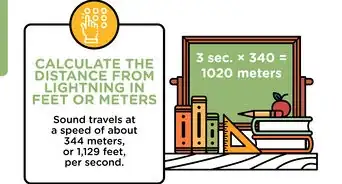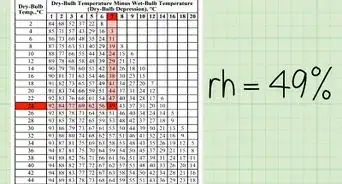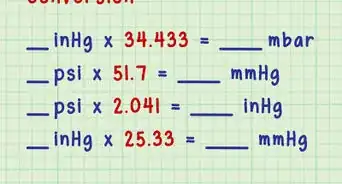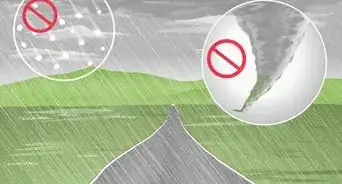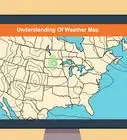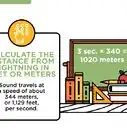This article was co-authored by Adina Zinn, MPA. Adina Zinn is a Certified Career & Life Coach and the Owner of Love Your Work Career and Life Coaching. With five years of experience, she specializes in using a holistic coaching approach to help people achieve their career and life goals. Adina earned a BA from The University of California, Santa Cruz and an MPA from San Francisco State University. She is also a Certified Career Coach through Career Coaches Institute and a Certified Life Coach through The International Coaching Federation.
There are 8 references cited in this article, which can be found at the bottom of the page.
wikiHow marks an article as reader-approved once it receives enough positive feedback. This article has 14 testimonials from our readers, earning it our reader-approved status.
This article has been viewed 252,189 times.
Atmospheric science studies factors that affect the environment, such as the changes in the Earth's physical characteristics. As a meteorologist, also called an atmospheric scientist, you are responsible for forecasting the weather and identifying changes in climate and weather patterns. This means that people depend on you for weather knowledge like tomorrow's temperatures or emergency weather situations, such as when hurricanes or tornadoes occur. However, before you can begin forecasting weather, you should know how to become a meteorologist.
Steps
Getting the Proper Education
-
1Take the right courses in high school. If you want to become a meteorologist, start preparing in high school. Take advanced math and science courses. Many schools offer AP courses that can transfer into college credit.
- Take calculus, physics, chemistry, and earth science.
- Hone your writing skills in English classes. Being a scientist means writing research papers and lab reports. If you become a meteorologist on a television station, you will have to communicate clearly.[1]
-
2Become familiar with technology. Meteorologists use computers to help with their research and weather predictions. They work with computer programs and computer models when doing research.[2] You need a deep understanding of computers and technology to pursue a career in this field.Advertisement
-
3Obtain a bachelor's degree in science. Meteorologists receive a bachelor's of science degree in meteorology or atmospheric sciences.
- In college, you will take math and science classes, such as calculus, physics, dynamics, synoptics, and some computer programming courses.[3]
- Some meteorologists receive degrees which combine meteorology with other scientific fields, such as chemistry, geology, oceanography, physics, or statistics. It may be beneficial to take computer science classes during your degrees, too.[4]
- If you want to be a TV meteorologist, take classes in journalism, speech, or other media-related fields.
- If you want to start working for the government right after your bachelor's degree, you will have to have completed courses which fall under strict guidelines.[5] You must have at least 24 credit hours of atmospheric science or meteorology.
-
4Get a graduate degree. Depending on the job you want, you may need to get a master's or Ph.D. Most meteorologists get degrees in related, interdisciplinary subjects. Some even get two master's in different sciences. Some graduate degree programs encourage bachelor's in a field like math or computer science instead of meteorology.
- Many higher level positions require at least a master's. If you want to do research, you will need a Ph.D.[6]
- There are about 100 undergraduate and graduate programs for meteorology.
-
5Get an internship. A good way to get experience at any point during your schooling - whether it's in high school, your bachelor's, or your graduate work - is to become an intern. Look for internships with local meteorologists. This will give you valuable hands on experience that can be put on applications and CVs.[7]
- If you can't get an internship, see if you can shadow them.
Developing a Career in Meteorology
-
1Determine the type of meteorology you're interested in pursuing. In addition to forecasting the weather, meteorologists study the characteristics and processes of the atmosphere and how they affect the environment and evolve. They also study climate and climate changes. There are many different kinds of meteorologists.
- An operational meteorologist is responsible for forecasting the weather.
- A climatologist gathers and examines the seasonal changes that occur over time such as months or years.
- A physical meteorologist conducts research on the atmosphere and different physical properties.
- A synoptic meteorologist uses mathematical models and creates different tools such as software for forecasting weather.
- An environmental meteorologist studies problems like air pollution that affects the Earth's atmosphere.[8]
- Not sure what type of meteorologist you should be? Ask a former teacher, professor, employer, or adviser what they think you’d excel in.
-
2Decide where you want to work. There are multiple places you can find jobs in meteorology. Each kind of work requires slightly different backgrounds, but graduate degrees can help you have a better chance getting jobs and receiving promotions.[9]
- You can work for government agencies, such as the Department of Defense, NASA, NOAA, or the National Weather Service.
- You can work for a television station, such as a local news network, a national network like CNN, Fox News, or MSNBC, or for The Weather Channel.
- You can also find work in the private sector. Many companies pay meteorologists to help figure out how climate and weather patterns will affect their business. Meteorologists can also get jobs dealing with agriculture or air pollution.[10] Airlines use weather forecasters to help them plan flights. Shipping and insurance companies may also hire meteorological consultants.[11]
- You may also be interested in being a forensic meteorologist. This job provides meteorological information, data, and consulting for legal cases.
-
3Get certified. The American Meteorological Society offers certification programs for certain specializations and areas of interest for meteorologists. Some of these programs include broadcasting and consulting.
- The American Meteorological Society offers Certified Broadcast Meteorologist credentials for meteorologists working in radio and television. The certification requires you to have a bachelor's degree in meteorology and you need to submit examples of your work to qualify. You must then pass an examination.
-
4Get any needed training. Some organizations require you to get training upon employment. For example, the National Weather Service requires employees to complete 200 hours of on-the-job training per year for 2 years.[12]
- Be prepared to receive more training and experience if you plan to obtain an entry-level position working for the federal government. The federal government typically places you in intern positions where you work in different offices learning about forecasting and weather systems. You're assigned to a duty station once the training is complete.
-
5Go to conferences. One way to network, meet people, and learn about new research is to go to conferences. Meteorological societies, such as the American Meteorological Society, sponsor conferences where meteorologists can present papers and research.
- This also can lead to publication in professional journals.
-
6Apply for jobs. Start searching online for job opportunities. Investigate job opportunities in the private sector for consulting jobs and apply. Try looking for jobs at news stations. You can start working at a small news station before advancing to a larger one.
- Look for a job with the federal government. The National Weather Service has stations located throughout the country. The U.S. Department of Defense also hires meteorologists.
- Seek job matching opportunities. Some universities and meteorological societies offer students and members help in matching them with jobs in the private sector.
-
7Be prepared to work hard. Being a meteorologist is a difficult job. You have to have excellent communication skills, especially if you want to work in broadcasting. You must have strong math, science, and computer skills since you will use those on a daily basis. You will have to learn how to work in a team.
- Be prepared to work in a variety of environments. Many meteorologists follow the weather, and sometimes these weather conditions are dangerous. Meteorologists will report from hurricanes, blizzards, and even tornadoes.
- You need to have a flexible schedule and willing to work long hours.[13]
- Look for a job with the federal government. The National Weather Service has stations located throughout the country. The U.S. Department of Defense also hires meteorologists.
Community Q&A
-
QuestionHow many types of jobs exist in the meteorology field?
 Community AnswerWell, there are weather forecasters, climatologists, researchers in atmospheric sciences, consulting meteorologists, lecturers, and weather broadcasters.
Community AnswerWell, there are weather forecasters, climatologists, researchers in atmospheric sciences, consulting meteorologists, lecturers, and weather broadcasters. -
QuestionI'm a teenager. What can I do at this age to prepare for a future in meteorology?
 Community AnswerTake as many math and science courses as possible, and as challenging as they come. Physics, geology, chemistry, earth sciences, calculus, and pre-calc will prepare you the most.
Community AnswerTake as many math and science courses as possible, and as challenging as they come. Physics, geology, chemistry, earth sciences, calculus, and pre-calc will prepare you the most. -
QuestionWhat college courses should I take?
 Community AnswerYou should take as much science and math as you can. Generally, you need Physics, Chemistry, Earth Science, and Geology, Pre-Calculus and Calculus. You may also want to take some computer courses.
Community AnswerYou should take as much science and math as you can. Generally, you need Physics, Chemistry, Earth Science, and Geology, Pre-Calculus and Calculus. You may also want to take some computer courses.
References
- ↑ https://www.universityofgalway.ie/academic-skills/communicationskills/downloads/Top-tips---written-communication-skills.pdf
- ↑ https://www.discovermagazine.com/planet-earth/how-weather-forecasts-are-made
- ↑ http://www.weatherwizkids.com/career-becoming-meteorologist.htm
- ↑ http://collegemouse.com/jobs/how-to-become-a-meteorologist.html
- ↑ https://www.bls.gov/careeroutlook/2004/summer/art01.pdf
- ↑ http://collegemouse.com/jobs/how-to-become-a-meteorologist.html
- ↑ http://www.weatherwizkids.com/career-becoming-meteorologist.htm
- ↑ http://collegemouse.com/jobs/how-to-become-a-meteorologist.html
- ↑ http://www.bls.gov/ooh/life-physical-and-social-science/atmospheric-scientists-including-meteorologists.htm#tab-4
- ↑ http://collegemouse.com/jobs/how-to-become-a-meteorologist.html
- ↑ http://education.seattlepi.com/long-meteorologists-school-2736.html
- ↑ http://education.seattlepi.com/long-meteorologists-school-2736.html
- ↑ http://www.bls.gov/ooh/life-physical-and-social-science/atmospheric-scientists-including-meteorologists.htm
About This Article
To become a meteorologist, begin by taking advanced science and math classes in high school to prepare for college. At the same time, familiarize yourself with computer technology to gain a deeper understanding of the programs meteorologists use. Next, go to college to earn a bachelor’s degree in meteorology or atmospheric sciences, and take courses that support the area of meteorology that you want to pursue. If you’re willing to work hard and put in long hours, you’ll be prepared for a successful career as a meteorologist. If you want to learn about the different fields of meteorology you could pursue, keep reading the article!















